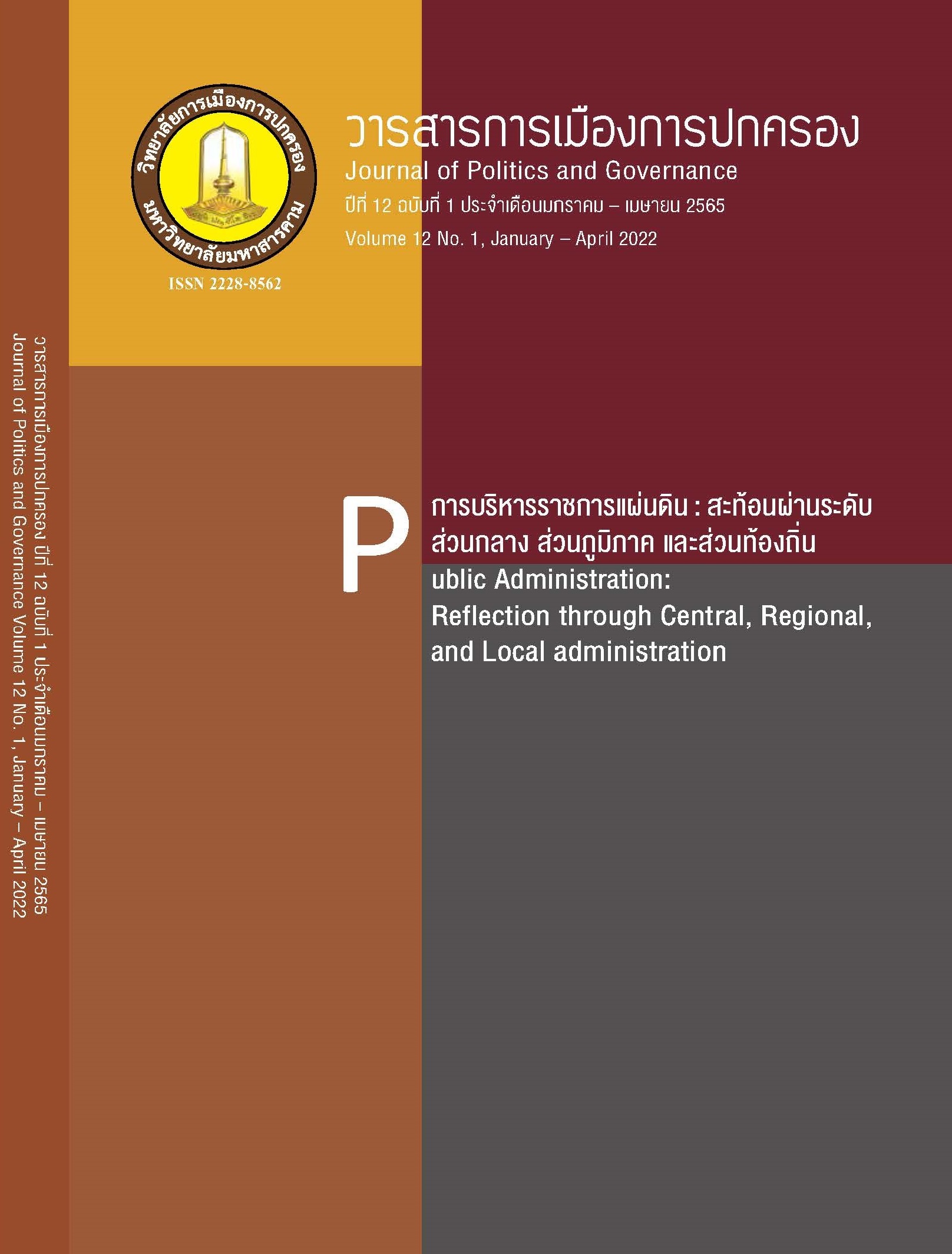A Comparison of Islamic Economics and the Sufficiency Economy Philosophy: Implications for Sustainable Development in Muslim Communities
Main Article Content
Abstract
This article examines the concepts and theories of Islamic economics. In order to understand it thoroughly, we compare with conventional economics and the sufficiency economy philosophy. In Islam, an individual’s utility function consists of two parts, utility in the present life and in the afterlife. His behaviour in the former determines the rewards (or punishment) in the later. Hence, his resources are allocated towards the consumption of goods and services, and for religious expenditures such as Zakat payment. In addition, the set of choices are a subset to a conventional individual as he can only consume what is Halal, including investing in interest-free channels. Ethical and moral values play a role in determining economic behaviour as individuals are connected through the concept of brotherhood. Though different in certain details, the core principles of the sufficiency economy philosophy are consistent with Islamic economics. This can help design development policies that are aligned with local values for Muslim communities, specifically, the three Southern border provinces of Thailand.
Article Details
References
Abduh, M. & Chowdhury, N.T. (2012). Does Islamic banking matter for economic growth in Bangladesh? Journal of Islamic Economics, Banking and Finance, 8(3), 104-113. Retrieved from https://www.researchgate.net/publication/265580866_Does_Islamic_Banking_Matter_for_Economic_Growth_in_Bangladesh
Abduh, M. & Omar, M.A. (2012). Islamic banking and economic growth: the Indonesian experience. International Journal of Islamic and Middle Eastern Finance and Management, 5(1), 35-47. Retrieved from https://doi.org/10.1108/17538391211216811
Adireksombat, W. & Sirichote, P. (2011). The Analysis of Postgraduate Theses in the Field of Science and Technology that Integrate the Sufficiency Economy Philosophy. Journal of Information Science, 29(1), 33-42. Retrieved from https://so03.tci-thaijo.org/index.php/jiskku/article/view/6130
Azzi, C. & Ehrenberg, G. (1975). Household allocation of time and church attendance. Journal of Political Economy, 83(1), 27-56. Retrieved from https://www. jstor.org/stable/1833272
Beck, T., Demirguc-Kunt, A., & Merrouche, O. (2013). Islamic vs. Conventional banking: Business model, efficiency and stability. Journal of Banking and Finance, 37, 433-447. https://doi.org/10.1016/j.jbankfin.2012.09.016
Becker, G. S. (1976). Altruism, Egoism, and Genetic Fitness: Economics and Sociobiology. Journal of Economic Literature, 14(3), 817-826. Retrieved from https://www.jstor.org/stable/2722629
Bhanthumnavin, D. & Bhanthumnavin, D. (2007). Sufficiency economy at individual level : theory and research findings for the construction of psycho-behavioral indicators. NIDA Development Journal, 47(1), 27-80. Retrieved from https://so04.tci-thaijo.org/index.php/NDJ/article/view/2697
Darrat, A.F. (2002). The relative efficiency of interest-free monetary system: some empirical evidence. Quarterly Review of Economics and Finance, 42, 747-764. https://doi.org/10.1016/S1062-9769(01)00119-3
Darwish, A. F. & Zain, M. S. (1984). Effect of Zakat on the total consumption function in an Islamic economy. Journal of Research in Islamic Economics, 2(1), 59-67. Retrieved from https://ideas.repec.org/a/abd/crieja/v2y1984i1no14p59-67.html
Donkwa, K. & Limpasirisuwan, N. (2011). Marketing strategies of Thai business sector for decision-making to purchase products based on self-sufficiency economy. Humanity and Social Science Journal, 2(2), 145-164. Retrieved from https://so02.tci-thaijo.org/index.php/human_ubu/article/view/85493
Furqani, H. & Mulyany, R. (2009). Islamic banking and economic growth: Empirical evidence from Malaysia. Journal of Economic Cooperation and Development, 30(2), 59-74. Retrieved from https://sesric.org/files/article/308.pdf
Hassoune, A. (2002). Islamic banks profitability in an interest rate cycle. International Journal of Islamic Financial Services, 4(2), 43-50. Retrieved from https://iaif.ir/images/khareji/articles/bank/28.pdf
Iannaccone, L. (1998). Introduction to the economics of religion. Journal of Economic Literature, 36, 1465-1496. Retrieved from ttps://www.jstor.org/stable/2564806
Isa, M.M. & Kaleem, A. (2006). Islamic banking and money demand function in Malaysia: an econometric analysis. Pakistan Economic and Social Review, 44(2), 277-290. Retrieved from https://www.jstor.org/stable/25825298
Kahf, M. (1980). A Contribution to the Theory of Consumer Behaviour in an Islamic Society. In Studies in Islamic Economics by Ahmad, K., Ed. Leicester: The Islamic Foundation. Retrieved from https://www.econbiz.de/Record/ a-contribution-to-the-theory-of-consumer-behaviour-in-an-islamic-society-kahf-monzer/10002197836
Khan, A. (1982). Adjustment mechanism and the money demand function in Pakistan. Pakistan Economic and Social Review, 20(1), 36-51. Retrieved from https://www.jstor.org/stable/25824944
Khan, M. A. (2013). What is wrong with Islamic Economics?: Analysing the present state and future agenda. Edward Elgar Publishing.
Khan, M.F. (1986). Macro consumption function in an Islamic framework. In: Contributions to Islamic Economic Theory. Palgrave Macmillan, London. https://doi.org/10.1007/978-1-349-07728-1_11
Khewpairee, V. (2017). Risk assessment compatible with sufficiency economy philosophy of community enterprise in Bangkok. Journal of Thonburi University, 11(25), 43-55. Retrieved from https://so03.tci- thaijo.org/index.php/trujournal/article/view/85660
Krusakayawong, A. (2009). The application of sufficiency economy philosophy on the economic development of Chumphon, Ranong, and Suratthani province. Chulalongkorn Business Review, 31(3), 47-62. Retrieved from https://cbsreview.acc.chula.ac.th/Pages/Issue.aspx?no=UDdB3iOZMuE%3d
Kullanant, N., Leiwruangrat, P. & Bhoonyaritanont, N. (2011). Participating development for sustainable strengthening community regarding sufficiency economy philosophy in Sobsao village, Ta-Sobsao sub-district, Maeta district, Lamphun province: phase 1. FEU Academic Review, 4, 19-31. Retrieved from http://journal.feu.ac.th/pdf/v4i%E0%B8%9E%E0%B8%B4%E0%B9%80%E0%B8%A8%E0%B8%A9t3a3.pdf
Kumru, C. & Sarntisart, S. (2016). Banking for those unwilling to bank. Economic Modeling, 54, 1-12. https://doi.org/10.1016/j.econmod.2015.12.011
Mack, P.R., & Leigland, T.J. (1982). Optimizing in households, towards a behavioral theory. The American Economic Review, 72(2), 103-108. Retrieved from https://www.jstor.org/stable/1802313
Metwally, M.M. (1981). Macroeconomic models of Islamic doctrines. London, J.K. Publishers. Retrieved from ttps://www.amazon.com/Macroeconomic-Models-Islamic-Doctrines-Metwally/dp/0906216893
Mongsawad, P. (2007). Sufficiency economy philosophy and economic management. NIDA Development Journal, 47(1), 159-179. Retrieved from https://so04.tci-thaijo.org/index.php/NDJ/article/view/2701
Muangme, C. (2016). The strategy marketing of the small enterprises in accordance to sufficiency economy philosophy. Journal of Information, 15(1), 90-101. Retrieved from https://so03.tci-thaijo.org/index.php/oarit/article/view/89853
Munlerk, B. (2013). Application of the sufficiency economy philosophy to management by administrative officers of sub-district administrative organizations in Nakhon Pathom province. Master’s Thesis, National Institute of Development Administration, Bangkok. Retrieved from https://repository.nida.ac.th/handle/662723737/2082
Naqvi, S.N. (1981). Ethics and economics: an Islamic synthesis. The Islamic Foundation; Leicester, UK. Retrieved from https://www.amazon.com/Ethics- economics-Islamic-synthesis-economic/dp/0860370801
Pankaew, P. (2014). Attitudes toward sufficiency economy philosophy, quality of work life, and social and organizational citizenship behaviors of employees in a private company. Silpakorn University Journal, 34(2), 1-22. Retrieved from https://so05.tci-thaijo.org/index.php/sujthai/article/view/21334
Phanijchanont, S., Vajirakachorn, S., Suwansujarit, S. & Suppadit, T. (2011). Participation in sufficiency economy project and change in environmental concern and conservation behavior among Thai-Karens. Journal of Environmental Management, 7(1), 59-74. Retrieved from https://so02.tci-thaijo.org/index.php/JEM/article/view/29062/24976


